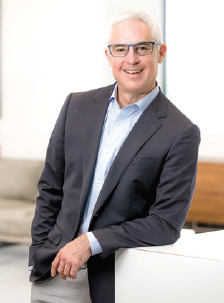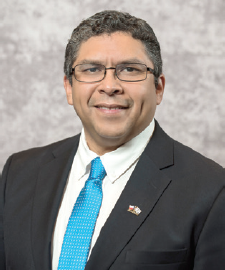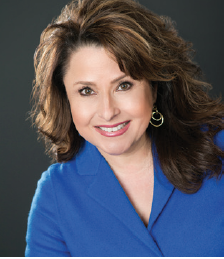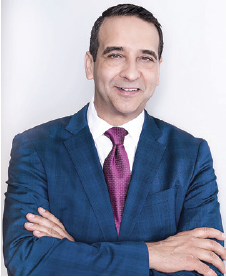Energy Panel
Story: Melissa Rondon
ENERGY: WHERE DO WE STAND?
The energy, oil and gas industry plays such an important role in the U.S. economy. The global demand for oil continues to grow. With laws and regulations taking effect almost on a daily basis, we have reached out to some of the most important Latinos in Energy, Oil and Gas to talk about the importance and progress of this industry for our country, the talent pool, and our community.
Latinos are the fastest-growing ethnic group in the nation, and we have different expectations from businesses. “They expect us to be advocates, and they expect us to be engaged with them in the community sense,” says Margita Thompson, and companies like hers are taking notice. Our panel of Latino energy experts talk with us about the state of the industry, increasing executive diversity, and changing the face of oil and gas as we know it.
Energy is an industry that touches every possible facet of our lives, from lighting and heating our homes to our commute to work. Even our daily goods, like plastic grocery bags or that Tupperware you take your lunch in, can be traced back to fossil fuels. Oil is a resource we depend on and, according to Hugo Gutierrez, the demand for fossil fuels (and the products they’re used to produce) isn’t going anywhere any time soon. “Global oil demand is expected to continue growing through 2040,” he says, and furthermore “The US is projected to be a net energy exporter by 2020.”
This projection, however, does nothing to remedy the image problem faced by oil companies. “A lot of people, particularly millennials … have been brought up to think that oil is terrible, that oil pollutes,” says Gutierrez, highlighting the growing concern (especially among young people) that fossil fuels are destroying our planet. While it’s true that fossil fuels have an environmental impact, the same can be said of electric cars and other “sustainable” options. “I drive a Tesla,” says Arcilia Acosta. “I don’t think people realize how much comes out of the ground to make that car!” Gutierrez emphasizes her point, adding, “You can’t make the car itself without a byproduct of oil and natural gas,” and he’s right: those plastic components have to come from somewhere, and the factory that assembles them needs power, which is largely generated from coal or other fossil fuels. Even with the rise of renewable energy sources, the weaning off of fossil fuels is going to take time.
The central role played by fossil fuels makes the industry uniquely positioned to effect change across different markets. “Oil and gas plays such a pivotal part in the economy, in national security, et cetera,” says Victor Carrillo. “The energy sector has a ripple effect.” And he has a point: the energy industry touches so many different facets of our daily lives, and Latino representation in energy boardrooms is important. Far from a dying industry, Carrillo sees an opportunity to elevate Latinos to leadership positions, improving diversity in C-suites across industries. Speaking on improving Latino diversity in corporate boards, Carrillo says, “It impacts the different sectors, not just energy.”
The energy sector is burgeoning with upwardly mobile opportunities for Latinos. There are “tremendous opportunities within the oil and gas sector,” according to Gutierrez. “Any Latino that graduates with an engineering degree … you are going to get hired immediately by some of the biggest companies in the world.” He pauses, then adds, “It’s still cool to major in math [or] science.” Even for non-college graduates, there are six-figure positions available in the industry, and the demand for those positions continues to grow.
David Hernandez agrees with these points, adding that deregulation is crucial to improving diversity in corporate leadership. “Deregulation gets you a lot closer to diversity,” he says. “Hispanics can compete very effectively … so long as there are no government protections for these large incumbent monopolies.” David has seen this firsthand in his work in commercial energy, fighting for the right to compete with established energy giants, state by state. Hernandez thinks that the right thing for legislators to do is to bring competition back to “stodgy industries,” as he puts it, because that will allow diversity to flourish. “Deregulation equals diversity,” he says.
Furthermore, increasing competition in the industry actually creates more space for renewable options. “Competition is actually helping bring about more renewable energy resources without the hand of the government being involved,” says Hernandez. He makes a good point: fossil fuels and renewables aren’t mutually exclusive. Margita Thompson has used this more symbiotic concept to connect her company with the community, “embracing an all-ofthe-above energy approach ... a balanced approach. We’re not deriding renewables, but showing how each can enable the other.” She’s working to increase energy literacy among stakeholders, especially members of the community, through direct action. “[We’re] providing the face of the industry through the employees and making that emotional connection,” she says. That connection is important, especially to Latinos: “they expect us to be engaged with them in the community sense,” says Thompson. Her strategy reflects a growing realization among energy companies that, in order to remain competitive, they have to engage differently with their customers. “We were one of the last industries to embrace social media,” explains Gutierrez, and there’s a lot of catching up to do. That’s why diverse leadership is so important. Victor Carrillo puts it succinctly: “It’s one of those top-down approaches that just has to happen.” +
PANEL SPEAKERS
(from left to right)
Hugo Gutierrez:
Senior Government & Community Relations Manager of Marathon Oil and lobbies for oil and gas at both the state and federal levels.
Victor Carrillo:
Currently sits on the board of Energy Hunter Resources, but has a background overseeing the regulatory side of the oil and gas industry.
Margita Thompson:
Serves as Vice President of Communications at California Resources Corporation, working to improve public perception of the oil and gas industry.
Arcilia Acosta:
The current CEO CarCon Industries/STL Engineers. She has served on a number of corporate boards in the oil and gas industry since 2008.
David Hernandez:
President & CEO of Liberty Power, a company working to disrupt the retail energy market that currently serves 100 of the Fortune 500 companies in 13 states and Washington DC.






